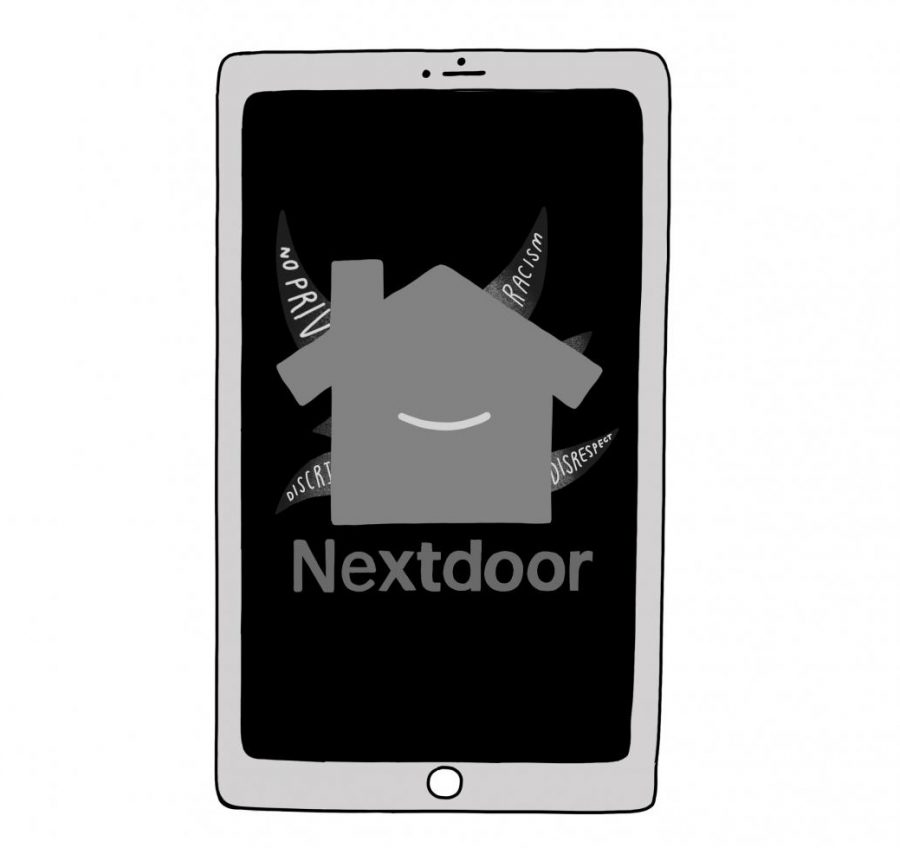A deep dive into the dark side of Nextdoor
Nextdoor isn’t just another friendly neighborhood app: hidden behind its seemingly good intentions is blatant violation of privacy and deep-rooted social unrest.
May 20, 2019
The Nextdoor post looked normal enough: “Bad odor in the air,” a new neighbor wondered. “Does anyone know what it is?” another chimed.
The responses started pinging in.
“That is the conscience of our current city council and mayor dying as they still consider selling the golf course to developers.”
“It could be people cooking curry (not trying to be funny).”
And then perhaps the most telling: “Welcome to the neighborhood.”
Welcome to Nextdoor. An app that advertises as a “private social network for your neighborhood,” Nextdoor functions as a method of virtual porch talk, through which users can borrow sugar, arrange carpools, discuss local politics and bash the bratty kid down the street.
The premise is tempting — the app merges socialization with matters of convenience, and true to the digital age, allows a wider engagement with a community at your fingertips. Nextdoor’s popularity reflects this: nationally, 90% of the nation’s neighborhoods use the application, and even on a local scale, a large number of San Ramon Valley residents utilize the app as their primary conduit for local news.
The goal is simple enough, but with the app comes both the pitfalls of traditional social media as well as the complications of neighborhood dynamics. Bluntly put, the site looks largely innocuous, but amidst the relevant postings, a subculture of racial profiling, conspiracy theories and a general disregard for privacy permeate. These problems then translate to visible consequences for locals.
I realize that this seems somewhat exaggerated; Nextdoor can be exasperating, but I’m sure many think calling the site dangerous is pushing it.
I had the same view; I originally began writing a satirical (but way less opinionated) piece, in which I poked fun at the avalanche of “Dog barking last night. This is illegal!” posts and an extremely tension-filled conversation regarding bikers on sidewalks (which, to give my two cents, is absolutely acceptable, given the reckless driving in this area). Nextdoor provides a glimpse of the frazzled minds behind the flawless and extremely identical facades of local homes, and honestly, frazzled parents are kind of hilarious. I was going to mention how the gaudy green of the app banner was the same color as the lawn my neighbor watered Every. Single. Day during drought season, while the rest of us were lectured on five minute showers.
The app is a wonderful and comical representation of the idiosyncrasies of San Ramon life, of life in general. However, its on-point reflection off the latent toxicity in local opinions and culture was far less humorous.
I did a lot of scrolling through posts during my initial ‘research’, and the first observations that popped out were the frequent reports of “suspicious behavior” about African American or Latino neighbors.
While a few posts reflected genuine concerns, a large majority provided little to no rationale on what made the individual suspicious, merely stating the fact the individuals were strangers and either ‘rang the doorbell,’or drove or walked by the house. Descriptions were little more than the near ubiquitous word “hoodie,” the minority group and a warning for neighbors to “keep their eye out.”
The comments section could also devolve into an equally toxic mess: many neighbors encouraged posters to “call the police” just to “be safe.”
Most of us carry no misconceptions that San Ramon is a completely tolerant place. For all the diversity that this area holds, it too is prey to destructive and close-minded sentiments. However, Nextdoor amplifies these often unconscious sentiments and cloisters them into the “Crime and Safety” tag.
These online interactions can have devastating impacts offline; the East Bay Express reported how racial profiling on Nextdoor in neighborhoods in Oakland led to some white residents hiring private patrols and calling the police on neighbors at unsettling rates. The OPD Assistant Chief Paul Figueroa said that racial profiling could go unchecked in online groups, leading to police having to respond to “baseless suspicions.”
The article mentioned one incident wherein a white woman posted about a “light skinned black female” seen walking her dog, wondering, “I don’t recognize her. Has anyone described any suspect of crime like her?” Someone later posted that the woman in question had lived in that neighborhood all her life.
Posts like this ring far too familiar; there are countless others that are similar within our own Nextdoor feed. Branding minorities as “potential robbers” or “suspicious” based on appearances for something as minuscule as walking down a street is ridiculous and outright racist. Users often complain that the ‘race card’ shouldn’t be pulled and any activity that could be suspicious should be reported, but it’s forgotten who these posts truly impact. The posts don’t make neighborhoods any safer, they just exacerbate racism and create an unsafe environment for minorities.
This local “vigilante culture” also bleeds into other aspects of Nextdoor, namely privacy. In the world of local media, public shaming has become the norm.
One individual posted a picture of a car with its license plate, complaining that they saw a female and a male inside and were “uncomfortable with the apparent activity occurring in the car as we have young children all along our block.” They then beseeched the parents of the individuals to make the couple change their spot.
I cannot get over this breach of privacy: if the individual in question has the guts to expose this couple to an audience of thousands of people, they can surely muster up the nerve to ask the couple to desist in their activities themselves, without getting others needlessly involved. This post can lead to horrible implications for the teenagers and the parents of the teenagers.
This post is not alone; there are countless others that publicly shame teenagers and provide identifying information for offenses raging from Juuling, making out or simply parking. The unspoken sentiment seems to be “parent your child right or else we’ll publicly shame your whole family .”
The same is applicable with complaints about “next door neighbor’s dog barking through the night.”. We all prefer the dog to stay silent, just as we prefer you to stay silent, but we know that neither one is going to happen, so you might as well take action yourself instead. Why you chose to share this tidbit with all the inhabitants of Danville, Pleasanton and San Ramon is beyond me, especially considering an actual conversation with the people who live literally next door is infinitely more efficient.
Many on Nextdoor are far too trigger-happy. With a phone constantly in their hand, residents can find it easy to revert to posting before understanding the situation or starting an actual in-person dialogue. A post may take 20 seconds to write and post, but it could waste large amounts of time for the neighbor who is in the process of training their dog and now has to deal with a noise complaint without being warned of the situation first. The same is applicable to other small grievances in the community.
Nextdoor also is host to a considerable amount of sensationalized, extreme or fake content, which can feed into an often prevalent sense of paranoia amongst parents in the community, causing tangible consequences in students’ lives.
Recently in response to the California Comprehensive K-12 Sex Education, one parent posted links to right-wing websites that accused the state of teaching children “pedophilia” and “[undermining] families, parental authority, cultural values and the very principles this nation was founded upon” from the California Family Council. This is, in the words of one commenter, nothing more than “fear-mongering.” To say pedophilia is part of health curriculum is nothing more than a blatant lie and I’m sure we’re all well-aware that health classes aren’t turning us into “hypersexualized beings.” Consequentially, that post inspired many parents to write that they would pull their children out of sex education.
By encouraging such conspiracy theories and lies on Nextdoor, posts like this can, and will continue to lead to, preventing many children from not getting the formal and unbiased sexual education that they deserve.
With social media sites like Twitter or Facebook, this move towards more sensationalized content has dire repercussions: harassment and the proliferation of fake news (think Russian hackers on Facebook circa 2016).
That’s not any less true on a smaller-scale, more filtered form of social media like Nextdoor. Amidst the innocuous content on carpooling and rent, sprinkled posts and comments reveal its “dark underbelly”.
What can be done about this problem? Most of us will end up joining the app, or maybe a just neighborhood Facebook group or text conversation now or in the future. Many have already started to get more actively involved in our communities through social media. It is our responsibility to be judicious, educated and unbiased about the content we choose to share. Instead of letting misbehavior, racism and public shaming slide, we need to stand up to people who choose to dispense such toxicity, in addition to not posting this content ourselves.
Our interactions on Nextdoor and social media have a huge role in transforming the community consciousness; let’s hope our generation uses our online responsibility for good.






Kathy • Apr 19, 2022 at 10:49 pm
That happens in Springfield Mo constantly..people too busy up in others business and causing undue tickets to be given because dorks bark..dogs bark around here when someone or something lingers around too long…it’s called look and see what’s going on before you call your friends and the police complaining could be someone in your yard..I’m sick of how people are…certain ones around like to slip around and make them bark so they can film the dogs knowing they are the reason the dogs are barking in the first place..I don’t like my neighbors but I don’t bother them either…it’s called a form of harass bullying and terrorizing…
Peter • Oct 17, 2020 at 3:48 am
Keep in mind we also live in the age when you try and have a conversation it’s Simeon about an issue they go off on you and you have even more problems than when you started. And that’s if they don’t get violent.
Will • Nov 7, 2019 at 12:48 am
I was looking for a dark mode setting for Nextdoor since the white UI is bright at night and found this article. An interesting read and I’ve noticed what you’ve written about within Nextdoor and on my neighborhood Facebook page. I think the main issue is that social media is turning lots of us into introverts who find it easier to publicly shame people instead of walking up to them. It’s really sad and more kids seem to be losing their social skills due to social media.
Will • Nov 7, 2019 at 12:47 am
I was looking for a dark mode setting for Nextdoor since the white UI is bright at night and found this article. An interesting read and I’ve noticed what you’ve written about within Nextdoor and on my neighborhood Facebook page. I think the main issue is that social media is turning lots of us into introverts who find it easier to publicly shame people instead of walking up to them. It’s really sad and more kids seem to be losing their social skills due to social media.